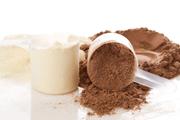
Halal Whey: Your Source of Pure Protein
Have you heard of Halal whey protein? Whey protein is gaining popularity, particularly among Halal-conscious buyers. It is recognized for its countless health benefits, such as providing strength, immunity, and natural muscle repair. Whey has natural amino acids that help build and maintain general wellness. Some nutritionists recommend whey protein as an alternative to other more common natural foods, and many whey protein products are sold everywhere from grocery stores, food nutrition specialty stores and online.
However, selecting a suitable whey protein free of non-Halal elements is vital for those who follow a Halal diet. That makes Halal whey protein essential in the market. This blog will examine Halal whey protein and why it should be part of our regular diet.

What is Whey Protein?
Whey protein is a liquid part of milk that remains after making cheese. During cheese production, milk is separated into solid curds (which become cheese) and a liquid known as whey with the help of enzymes called rennet. The whey is then processed into whey protein powder for consumption. Whey protein can come in different forms like Concentrate, Isolate, or Hydrolysate. Each is processed and has a different nutritional value, but not all are Halal.
What is Halal Whey Protein?
Halal Whey protein refers to the whey that is produced with Halal-certified rennet, without non-Halal additives or processing agents, and certified by trusted certification bodies like ISA Halal. Halal whey protein is processed following Halal dietary requirements. The primary ingredient determining the Halal status of whey protein is the source of the rennet. Some rennet is sourced from pig and non-Halal animals, while others are from Halal sources such as synthetic microbial enzymes. If the rennet is certified Halal, the whey protein would be Halal.

Why is Halal Whey Protein So Important?
Halal whey protein is crucial based on its incredible health benefits, purity, and Halal status. Here are some reasons you might consider including Halal whey protein into your diet:
1. High-Quality Protein Source: Halal whey protein contains all amino acids necessary for muscle repair, growth, and recovery. It is helpful for athletes and anyone looking to maintain or build muscle. It also supports faster recovery and stimulates muscle growth without any side effects.
2. Immunity Booster: Halal whey contains proteins like immunoglobulins, lactalbumin, and lactoferrin. These protein components can help to repair weakened immunity and boost energy.
3. Easy to Digest: Whey protein can easily be absorbed and digested, making it an ideal alternative for people with digestive-related issues. When included in a well-balanced diet, Halal whey can help you maintain and achieve a perfect weight in a natural way.

4. Halal Assurance: Choosing Halal-certified whey protein creates trust by ensuring that your protein sources correspond with your Halal values. It is free of harmful ingredients and additives that are dangerous to health. You can include it in your diet without fear of non-Halal substances.
In summary, Halal whey protein is produced according to Halal dietary guidelines. It is a good choice for Halal-conscious buyers looking for a healthy lifestyle. If you are buying Whey protein powder, buy Halal certified products. Opting for whey products with certification logos from trusted Halal certification agencies provides assurance that the product meets all Halal requirements before being certified as Halal whey protein.
Islamic Services of America (ISA) is a leading USA-based Halal certification and auditing organization that has served companies, the community, and the Halal certification industry for 50 years. Contact ISA at isa@isahalal.com or send your initial inquiry to Halal certify your products at https://isahalal.com/contact or visit the ISA website for more information at https://isahalal.com
picture credit: canva